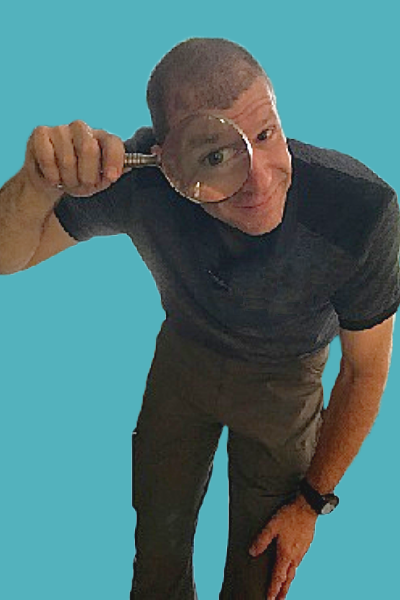We all struggle with many different things in our lives, both from a business as well as a personal standpoint. One thing that almost all of us struggle with is having a difficult time finishing things that we start. While some of us may struggle more than others in this regard, Shiny Object Syndrome (SOS) is very real and, in one way or another, affects everyone’s lives.

Entrepreneur magazine defines SOS as a “disease of distraction.” It likens it to a “small child chasing after shiny objects,” whereas once they get the shiny object and see what it is, “they immediately lose interest and start chasing the next thing.” They theorize that entrepreneurs (and small business owners) tend to be highly motivated and like to investigate and try new things, which leaves them especially susceptible to the perils of SOS.
It seems that everyone who runs a small business, in one way or another, can fall victim to Shiny Object Syndrome. We’re typically interested in things that are new: new ideas, new tools, new toys, new methods and new people. These new things can often consume our attention, leading us to discard the previous shiny objects that had attracted our energy.
Some of us are more susceptible, but to some extent we all suffer from SOS. Judging by the number of unfinished projects around my home, I believe that my wife would argue that I’ve been completely overcome by SOS, and am in need of serious medical intervention…

We can certainly make an argument that Shiny Object Syndrome is a function of our modern, always plugged in, instantaneous, satisfaction-driven lifestyle. Anything and everything that we desire is almost instantly available to us, 24 hours a day, 7 days a week.
The reality is that SOS has been around much longer than any of our modern technology, but having access to everything in the world at the touch of a button certainly isn’t making it any better.
Because of SOS, we seem to be attracted to the latest and greatest thing, which makes it almost impossible to finish working on whatever is currently occupying our attention. Our current task, current idea, current job or current relationship all suffer because we’re eager to move on to the next big thing.
Moving on to something new (and seemingly better) is often easy to do. Completing what we’re currently working on, that’s typically difficult. Starting is easy; finishing is the hard part.
And that’s what often trips us up, the hard part.
It’s much easier to try a new diet, buy a new marketing plan, sign up for a new course, start a new relationship, than it is to work through the difficult parts of the thing you’re currently struggling with.
Shiny Object Syndrome can often spell doom for the small business owner, particularly one that is new to an industry. When starting out in a new small business, what may seem like an excellent marketing strategy can quickly go from top of mind to yesterday’s news. Once we start to struggle with implementation, once we’re not getting results as quickly as we thought we would, once things start to get a little difficult, we’re quick to blame the process and start looking for something “better.”
“There must be something wrong with this plan;
it’s obviously not working like they told me it would.”
The quote by Andrew Carnegie “Anything in life worth having is worth working for,” certainly hold true in business.
It’s easy to think about, research, pay for and try out new ideas in your business. The beginning is the easy part. Everyone likes trying out new ideas and methods. The hard part comes when the work starts: when we must put in the time to learn how the new software works, when we must read the instructions on how to implement the process, when we must dedicate time to watch the training videos or practice the new methods in real time, implementing this new knowledge in your business.
It’s difficult to start something new and discover that it’s really not as easy as you hoped it would be. (It never is, is it?) We’d all like things to be plug-and-play. No assembly required. Take it out the box and off it goes. Send one email and sales start rolling in like gangbusters. Wouldn’t that be great?

But, here in the real world, things don’t work like that. Starting something new is never plug and play. You’ve got to learn by trial and error.
Start something new.
Try it out in real time.
Make mistakes.
Figure out what went wrong.
Implement the corrections and try it again.
But that takes discipline, patience and self-control; traits that, unfortunately, are in short supply. Following this process is difficult. And probably the most difficult part for all of us is the part where we make mistakes. Face it, we all think we’re great at what we do, and we never make mistakes. We certainly wouldn’t start out planning on making mistakes. That sounds utterly crazy!
None of us like to fail. Failure sucks. Failure is, well, for failures.
“I’m not a failure.”
Failure is difficult for any of us to take. It’s difficult to make mistakes. It’s harder to learn from those mistakes. And it’s even harder to admit we’ve made a mistake, learn from it and implement changes based on what we’ve learned.
Failure is difficult to endure. Failure can prove detrimental to our (all too often) delicate psyche. We don’t like to fail. It’s against our nature; it goes against what we believe; it’s counter to our goals of success.
“I didn’t start this business to fail.”

We all want to believe that we’re infallible; that everything we do is going to work and that we will never make mistakes; that we’re perfect in our lives, both personally and professionally.
It takes a mentally tough individual to come to grips with the realization that we’re not perfect; that we’re going to make mistakes. And it takes an even tougher person to realize that we can actually gain something from our mistakes; that we can look forward to making those mistakes so that we can reiterate and start again, better, stronger and faster.
It’s a difficult and humbling experience, coming to grips with the realization that we’re not perfect in everything we do. It’s a hard pill to swallow. Unfortunately, most people cannot, and will not, ever be able to cross that hurdle. The facts bear this out: approximately 75% of all small business startups fail within their first two years.
It can be incredibly tempting to ditch that new marketing system when it doesn’t show results in the first three weeks and chase after the next shiny object. Especially when we’re constantly bombarded with advertisements showing our competition using the latest and greatest systems and getting amazing results in no time at all and with minimal effort!
The tough part is sticking with something when it gets difficult. When it starts to get hard, that’s when we need to double-down and give maximum effort. Try to figure out what’s not working and fix it before moving on to the next thing.
Now, I’m not advocating on sticking with something forever when it’s not working. But, if you’re honest with yourself, you’ll know the difference between something that doesn’t work and something that’s not working because you’re simply not trying hard enough.
Don’t concentrate on the 75% that fail. Look to the 25% that are having success and try to emulate them. Figure out where you’re getting stuck and concentrate on that log jam.

And don’t be afraid to fail. It’s what all the successful businesspeople are doing.
The brick walls are there for a reason. The brick walls are not there to keep us out. The brick walls are there to give us a chance to show how badly we want something. Because the brick walls are there to stop the people who don’t want it badly enough. They’re there to stop the other people.
Randy Pausch
Would you like to get an email every Friday where we share the newest things we’ve discovered about home inspections? CLICK HERE to sign up.
Want to be an Influencer in Your Field? Share This Post!
Thanks, Joe


